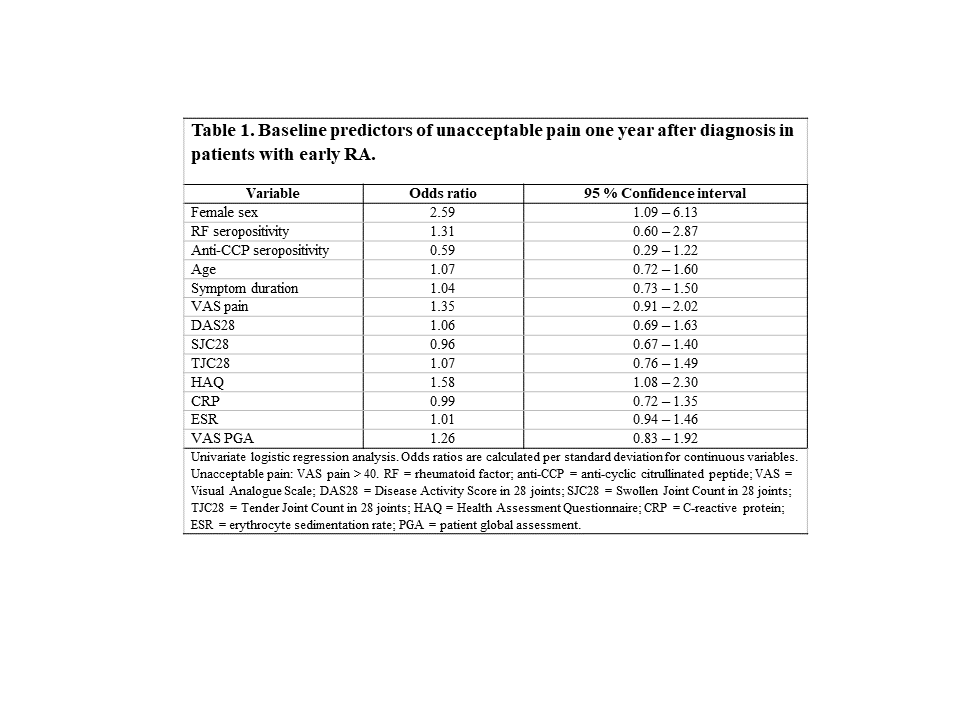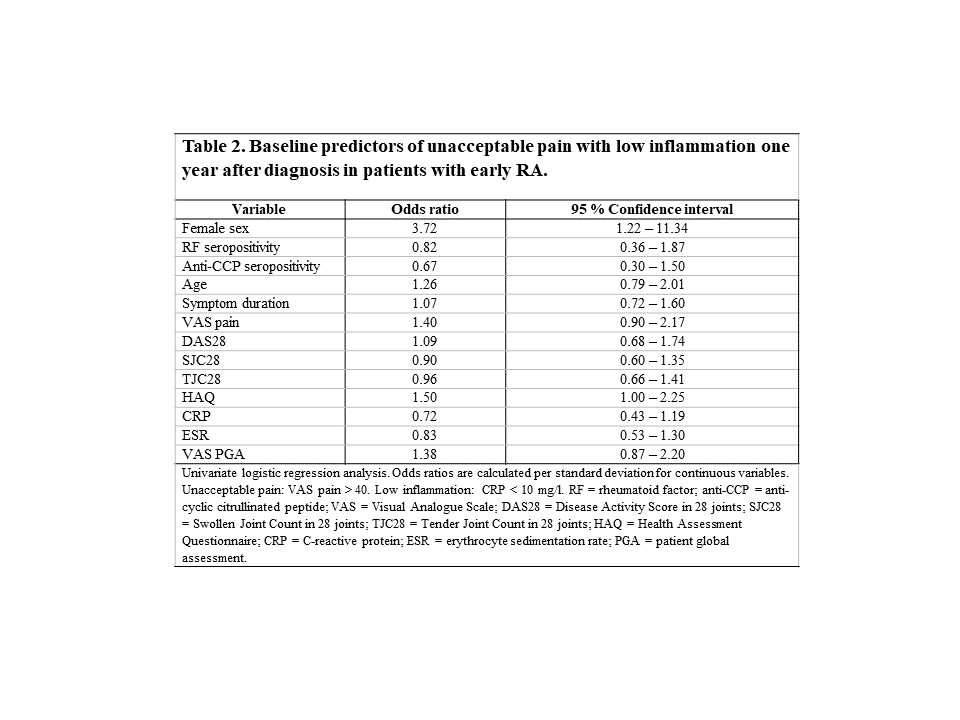Session Information
Date: Monday, November 9, 2020
Title: RA – Diagnosis, Manifestations, & Outcomes Poster IV: Lifespan of a Disease
Session Type: Poster Session D
Session Time: 9:00AM-11:00AM
Background/Purpose: Pain is a common and debilitating symptom in patients with rheumatoid arthritis (RA). In early RA it is usually due to ongoing inflammation and synovitis, but over time a substantial proportion of patients experience pain without laboratory or clinical signs of inflammation.
The objective of this study was to investigate predictors of unacceptable pain and unacceptable pain with low inflammation one year after diagnosis in patients with RA.
Methods: Consecutive patients with early RA (symptom duration < 12 months, fulfilling the 1987 ACR criteria and/or the 2010 ACR/EULAR criteria) were recruited between January 2012 and March 2016 from a defined geographical area. Patients were managed according to usual care, and were followed for one year after diagnosis. Pain was assessed using a visual analogue scale (VAS; 0-100 mm). Unacceptable pain was defined as VAS pain > 40 based on the patient acceptable symptom state (PASS) (1), and low inflammation as CRP < 10 mg/l (2). Baseline predictors of unacceptable pain, and unacceptable pain with low inflammation, were evaluated using logistic regression analysis.
Results: A total of 263 patients with early RA (mean age 59 years, 73 % female, 67 % anti-CCP positive, median symptom duration 5 months) were included, and 183 attended the 1-year follow-up. After one year 32 % had unacceptable pain and 22 % had unacceptable pain with low inflammation, the latter thus accounting for 69 % of all unacceptable pain. High scores for the Health Assessment Questionnaire (HAQ) disability index at baseline, and female sex were associated with unacceptable pain (Table 1) and also with unacceptable pain with low inflammation (Table 2) at 1 year in univariate analysis, whereas there were no such associations for swollen joint count or laboratory markers of inflammation (Table 1, Table 2). In multivariate logistic regression analysis, there was an independent association between higher HAQ and unacceptable pain after 1 year [adjusted odds ratio (OR); 1.56 per SD (95 % CI 1.06-2.28) (SD 0.65)] with a similar trend for patients with unacceptable pain and low inflammation (OR 1.47 per SD; 95 % CI 0.98 – 2.21).
Conclusion: Almost 1/3 of early RA patients reported unacceptable pain one year after diagnosis, implying the need for improvement in pain treatment. Patients with high self-reported disability at baseline were at increased risk of unacceptable pain at 1 year. This could be due to ineffective coping strategies and inactivity. The association between female sex and persistent unacceptable pain could indicate sex differences in disease severity, or in propensity for chronic pain. Unacceptable pain 1 year after RA diagnosis was not associated with any objective baseline measures of disease activity, indicating the need to find other predictors for long time severity of pain.
References
- Tubach et al. Arthrits Care Res 2012; 64: 1699-707.
- Olofsson et al. Arthritis Care Res. Online First 20 May 2020. doi:100.1002/acr.242664.
To cite this abstract in AMA style:
Eberhard A, Olofsson T, Bergman S, Mandl T, Turesson C. Predictors of Unacceptable Pain and Unacceptable Pain with Low Inflammation in Early Rheumatoid Arthritis [abstract]. Arthritis Rheumatol. 2020; 72 (suppl 10). https://acrabstracts.org/abstract/predictors-of-unacceptable-pain-and-unacceptable-pain-with-low-inflammation-in-early-rheumatoid-arthritis/. Accessed .« Back to ACR Convergence 2020
ACR Meeting Abstracts - https://acrabstracts.org/abstract/predictors-of-unacceptable-pain-and-unacceptable-pain-with-low-inflammation-in-early-rheumatoid-arthritis/


